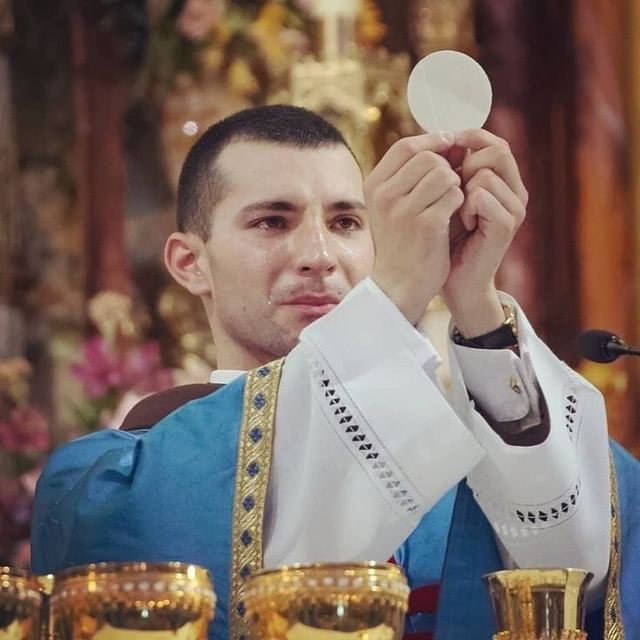What is the use of tears? St Padre Pio would answer; it is to be shed in gratitude for the greatest gift on earth, the Holy Eucharist. He used to cry with tears rolling down his cheeks while celebrating Holy Mass. Not only Padre Pio, but many other saintly priests had the same experience. Millions of believers through centuries experienced the saltiness of their own tears during the celebration of celebrations called Holy Eucharist.
If we have not yet experienced it, it is indicative of a serious problem; that we do not understand the true value of the Holy Eucharist. Nor do we understand the purpose for which the Lord ‘humbled himself and became obedient to the point of death – even death on a cross’ (Phil 2:8). The thought that we are supposed to be united to the crucified Lord during Holy Mass does not disturb our hearts. It is a really serious issue.
We have read of priests who attached a piece of cloth to their priestly mantles, the purpose being to wipe their tears while celebrating the Holy Mass. Nothing else could express their gratitude towards the Lord who gave them this indescribable but precious gift. The very memory of what our Lord did for us should make our eyes watery.
While instituting the Sacrament of Eucharist, Jesus stated that it was his body and blood. His words were crystal clear so as to leave no room for any other interpretation. What greater tragedy is there than receiving the Holy Eucharist without the conviction that it is the bread of eternal life and the chalice of eternal salvation! St Paul has warned us to be prudent in approaching this heavenly bread. ‘For all who eat and drink without discerning the body, eat and drink judgment against themselves’ (1 Cor 11:29).
Catechism teaches us that ‘in the most blessed sacrament of the Eucharist the body and blood, together with the soul and divinity, of our Lord Jesus Christ and, therefore the whole Christ is truly, really and substantially contained’ (CCC 1374). The Church further teaches that the Eucharistic presence of Christ begins at the moment of the consecration and endures as long as the Eucharistic species subsist. Christ is present whole and entire in each of the species and whole and entire in each of their parts, in such a way that the breaking of the bread does not divide Christ’ (CCC 1377).
It means that if a tiny bit of the consecrated host falls to the ground, Christ is present whole and entire in that part too. If this is the case, how can we stand before this sacrament of sacraments so casually and allow minute particles of the consecrated host to fall to the floor?
We receive the Lord without any respect, then move from there keeping the host in our hands and consume it with the same indifference with which we received him. Once we leave with the satisfaction of having received the Communion, Christ cries silently from the floor of the church; ‘please do not trample me’. But we have no time to listen! Christ remains there unattended, suffering the pain and indignity of not being recognized by the same people for whom he served his body and blood!
We will have to pay a heavy price for the indifference and irreverence that we exhibit at the time of receiving the Holy Eucharist. The practice of giving Holy Communion on the tongue was introduced with the noble intention that no room should be given to the sacred body and blood of Christ to be profaned. The Church still continues the same practice out of reverence to our Lord lest the consecrated host may fall, though unintentionally, to the ground. As far as Oriental Catholic Churches are concerned, giving Communion in both species, and indeed on the tongue, has been stipulated as the ordinary method of receiving Communion (CCC 1390).
If we forget so fast what our Lord said, and what the apostles instructed, and what the Church teaches, we will have to pay dearly for this forgetfulness too. The permission to give Communion in the hand given during the pandemic was an exception, but unfortunately, for many Catholics it has now become the rule. They do not mind, even if the priest is ready to give the Communion on their tongues!
We should introspect. How do we participate in the Holy Mass? Do we really understand the true value of the Holy Eucharist? Do we receive it in a worthy manner? Do our attitude and body language reflect our reverence towards the greatest gift that God has ever given us? Do we take utmost care not to allow even a minute particle from the consecrated host to fall to the floor?
Let us pray for the grace to be transformed into worthy vessels to receive the body and blood of our Lord and Savior Jesus Christ. Surely, when we receive the Lord in a befitting manner, we will not be able to contain the tears of joy and gratitude for this most precious gift from heaven.





















